Text
Hey guys! DON’T read the following tweets.

Like don’t. I’m not advocating for you guys to have access to materials not many can afford.

Don’t use any of these sites while I’m you’re in school.

Because let’s be honest, you should not have access to information

Like I said, don’t share this. Don’t get this out there to help a student.
2K notes
·
View notes
Text
I’ve been meaning to make this post for a while but I’m only getting around to it now because of the Power of Wanting to Procrastinate On Something Else.
You may be familiar with Ebbinghaus’s research on forgetting. Specifically, a graph that looks like this:
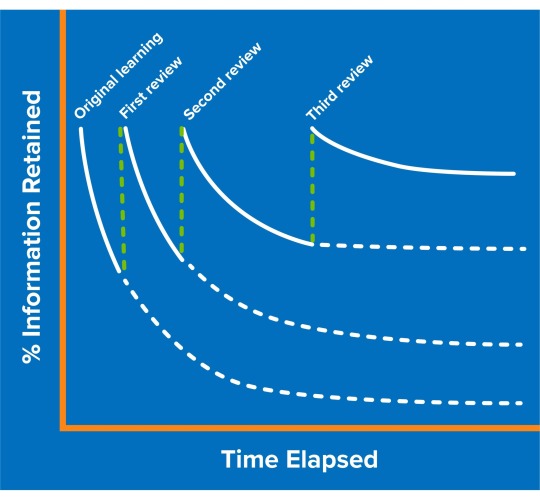
[Graph Source]
The TL;DR is that the more times you review something, the more you retain long-term. That’s why cramming may get you through a test, but you’re going to forget everything by the next semester.
So what exactly am I posting about? Well, I wanted to offer you my system for hijacking my memory systems to make sure I retain things with absolute minimum effort expended. I use this chart for all my classes (that I care about):
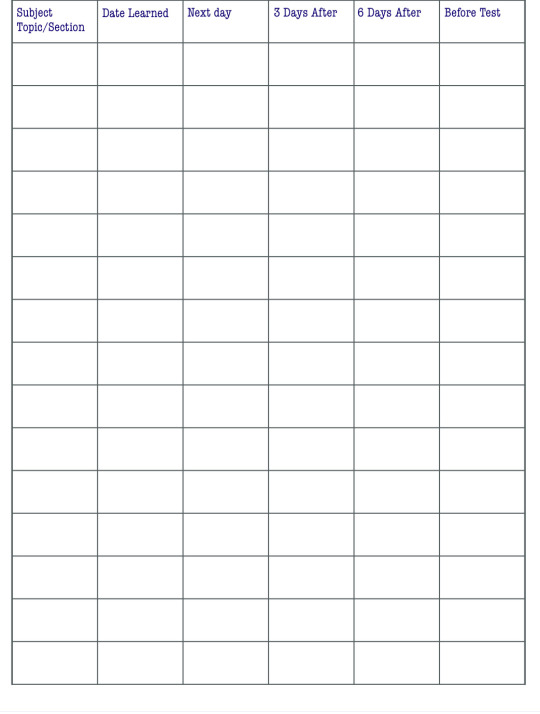
This is the ONLY reason I got an A in Statistical Methods II, considering I had forgotten everything from Methods I by the time I took it. Basically, just write down the section/concept/chunk of information and the date you first learned it. Then write down the next day’s date, then the date three days out from when you first learned it, then six days out from when you first learned it. I usually also pick a day before the exam/final to review each section.
As I go through the semester I check if I need to review something on a given day and then mark it off with a highlighter once I’m done. I try for maximum efficiency, usually by reading the textbook one day before the lecture (or one day after the lecture) then either doing the homework or just skimming back through my notes on day three. If I really, really, really need to understand something and I’m having trouble (like every single stats class ever) then I’ll re-write my notes on day 6 and combine the textbook + lecture notes.
It’s the lowest possible effort, because you don’t need to do anything fancy to review. Just spread things out as much as you can to take advantage of how your brain consolidates memories. Oh, and sleep. PLEASE SLEEP. You NEED sleep to retain information. I cannot stress that enough.
241 notes
·
View notes
Text
Hey guys! DON’T read the following tweets.

Like don’t. I’m not advocating for you guys to have access to materials not many can afford.

Don’t use any of these sites while I’m you’re in school.

Because let’s be honest, you should not have access to information

Like I said, don’t share this. Don’t get this out there to help a student.
2K notes
·
View notes
Text
Allergies
アレルギー: allergy (ger: Allergie)
アトピー: atopic; predisposition toward allergies
アレルギー症状/アレルギーしょうじょう [アレルギーしょうじょう] allergy symptoms
ナッツアレルギー: nut allergy
食物アレルギー[しょくもつアレルギー]food allergy
ペニシリンアレルギー: penicillin allergy
アレルフリー: allergy-free

187 notes
·
View notes
Text
14.2) Conditional Forms (たら)
Hey everyone! 👋🏾 Sorry I’ve been MIA for a few months. I moved up to full time at my high school this school year, so work has been kicking my butt. Anyway, here we go with a new post, just for you!
Last time we talked about the conditional なら and 4 ways to use it. In this post, let’s look at a different conditional form and when you might use / see it in everyday Japanese.
Here is your vocabulary:

【The Grammar】
Japanese has many helping verbs that add extra meaning to verbs and adjectives. One of these helping verbs is た, which shows that a verb is in past tense. Because た is a helping verb, it turns out that there are different forms you can use for different purposes*. たら is the conditional form of た!
In the same way that た can be attached to verbs and adjectives, so can たら. There is also a たら version of the copula for nouns. In addition, it can also attach to the negative forms of verbs, adjectives and nouns.

【What It Means】
A たら clause indicates that there is an event that needs to happen first in order for a second event to happen. This will translate to either “when”, “after” or “if” clauses in English, depending on the situation. Take a look at the following 3 English sentences:
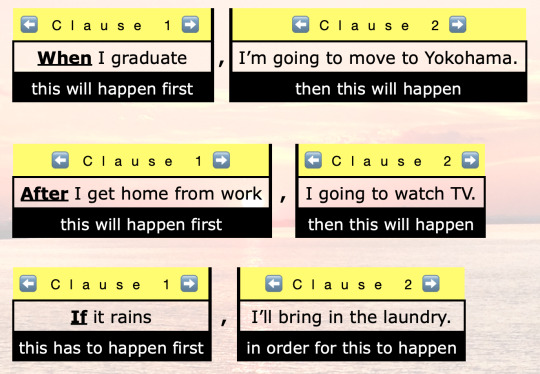
Even though たら has 3 different interpretations, the timing of the events is always the same. The event of the たら clause (clause 1) will always happen before the second event (clause 2).
【たら = When】
Let’s look at situations when たら means “when”:
①{昨日、デパートへ行ったら}、{友達に会った}。
= yesterday when went to the department store, saw friend
= Yesterday when I went to the department store, I saw my friend.
②{試験が済んだら}{長期休暇をとるつもりだ}。
= when tests were completed, take long vacation plan exists
= When my tests are done, I plan to take a long vacation.
【たら = After】
Sometimes, たら translates instead to “after”
③{薬を飲んだら}、{頭痛が治った}。
= After medicine drank, headache was cured
= After I took some medicine, my headache went away.
④{食べたら}{宿題をし始める}。
= after ate, homework will start
= After I eat, I’ll start my homework.
Notice that the literal translation of the たら clause is past tense however it’s the tense of the second clause that determines the real translation. Example 3′s second clause is in past tense, so the first clause will also become past tense. In example 4, the second clause is not in past tense, so the translation is not in past tense either.
【たら = If】
The majority of the time though, たら translates to “if”.
⑤{雨が降ったら}、{タクシーで行きましょう}。
= If rain fell, by taxi let’s go
= If it rains, let’s take a taxi (there).
⑥{お母さんがお金をくれなかったら}{どうしよう}。
= if Mother didn’t give us money, what should do
= If Mother doesn’t give us money, what should we do?
⑦{もしよかったら}、{コーヒーでも入れてくれませんか}。
= if it was good, can I receive you making some coffee =
If it’s OK, can you make some coffee for me?
In order to clearly show the “if” meaning of たら、the adverb もし is often used at the beginning of the sentence. It also helps to soften the meaning of the sentence.
【Alternate Reality たら】
たら sometimes is used to talk about alternate realities. The nuance here is that either something didn’t happen or that if something didn’t happen the outcome would be very different.
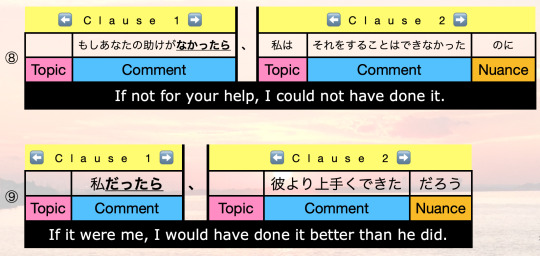
You can see that example 8, the speaker imagines a reality where he/she didn’t have the listener’s help in the first clause. Because the second comment is something that is not good (できなかった) this ends up showing appreciation. In example 9, the speaker imagines a reality where he/she did something. The comment says that it would have been better so this ends up expressing disappointment / annoyance.
In these kinds of sentences, the nuance section is very important because it will tell you if the sentence is expressing appreciation, regret, disappointment or just imagining a different timeline. Common sentence endings are のに (for regret) and だろう (for asserting a point).
【たら = How About If…?】
The final way that たら sentences are sometimes used is for suggestions.
⑩ もうちょっと塩味をきかせてみたら?
= if you added a little more salt (that might solve your problem)?
= You should add a little more salt.
As you can see, the nuance is that by doing what comes before たら, it might be a solution to whatever is the problem. In keeping with たら meaning “if”, you can think of this usage as “How about if…?”. But a more natural way to think of this is a suggestive “you should…”.
【The Second Clause】
Let’s end by talking a bit about the second clause. One thing to remember is that it has to be something that the speaker can’t control. In example 1, seeing a friend wasn’t something planned so this sentence sounds natural. If you replaced 友達に会った with 服を買った, it would sound strange because buying clothes is something that you can control.
Example 4 might seem like it goes against this rule. The truth is, because we can’t control the future, starting your homework is taken as intent and not as forecasting the future. Japanese is very weary of saying that something will happen if it’s not 100% guaranteed to happen.
【Conclusion】
So there you have it! I hope that now when you see たら tacked on to the end of words that you will have a better idea of what is going on. I hope that you also try using it in your daily conversation and see how your listener reacts. Smooth conversation means you did it right!
Next time, we’ll continue our look at conditional forms. See you then!
Rice & Peace,
– AL (アル)
👋🏾
* There are three forms of the た helping verb: (1) た (2) たら and (3) たろう.
たろう is rarely used but it asserts that something would have been the case. For example, “If he didn’t help me, I would have failed.” This is similar to the alternate reality section in this post.
208 notes
·
View notes
Text
Planty Stuff Pt.2

Harvest shūkaku 収穫
Rose bara バラ
Dew ro 露
Salad sarada サラダ
Greenhouse onshitsu 温室
Stem of the flower hana no kuki 花の茎
Tomato tomato トマト
Lawn mower shibagariki 芝刈り機
Tulip chūrippu チューリップ
Banana tree banana no ki バナナの木
Bench benchi ベンチ
Wood mokuzai 木材
Birch tree shiro kabanoki 白樺の木
Bouquet of flowers hanataba 花束
Bud. tsubomi つぼみ
Broccoli burokkorī ブロッコリー
Boxwood tsuge no ki ツゲの木
Bush busshu ブッシュ
Bulb kyūkon 球根
Cactus saboten サボテン
Celery serori セロリ
Cherry tree sakura さくら
Fungus ma kin 真菌
the way michi 道
Oak ōku オーク
Honeysuckle suikazura スイカズラ
Cabbage kyabetsu キャベツ
226 notes
·
View notes
Text
basic conjunctions & connectors
しかし: however
また: also
この後: after that
その時: at that time
場合は: if you, if this happens
例えば: for example
それから: then
だから: so
. ˚◞♡ ⃗ 📷 *ೃ༄: I'm not totally sure on the translation but pls correct me if I'm wrong, byee and have fun learning- fibbi
630 notes
·
View notes
Text
Fish words🐠🐟🐡

Kanji 魚
魚 【ギョ】 depicts a fish, which is also its original meaning.
On readings: ギョ
Kun readings: うお、さかな、[⋯ざかな]
魚[さかな]fish
魚屋[さかなや]fish market; fish dealer
魚肉[ぎょにく]fish meat
魚介[ぎょかい]marine products; seafood; fish and shellfish
魚釣[さかなつり]fishing
魚眼[ぎょがん]fish eye
魚粕[うおかす]fish meal
魚網[ぎょもう]fishing net
魚心[うおごころ]favor done for somebody
魚礁[ぎょしょう]fish reef; reef where fish live and breed
魚鋤[うおすき]seafood and vegetables cooked sukiyaki style
魚市場[うおいちば]fish market
280 notes
·
View notes
Text
Free Kana iPhone Wallpaper
Something that helped me a TON with learning Kana was having my lock screen be a chart for either Hiragana or Katakana. Having the repetition of looking at the chart over and over will lock the information deeper into your consciousness. It’s a simple trick that gives you a little extra push to your existing routine.
I tried finding lock screen wallpapers for the kana charts online, but I didn’t find any that I liked that were clean, bold, or fit my lock screen well.
So I made my own!
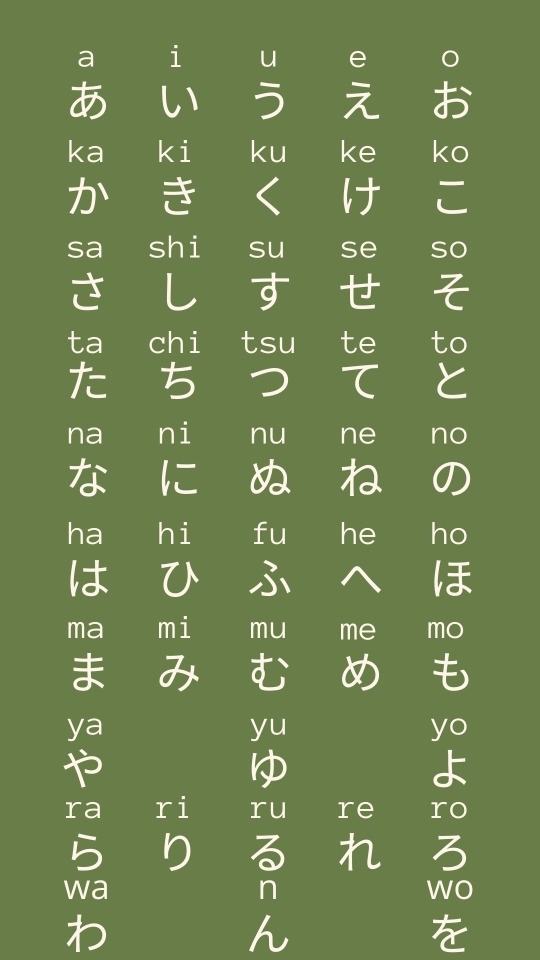
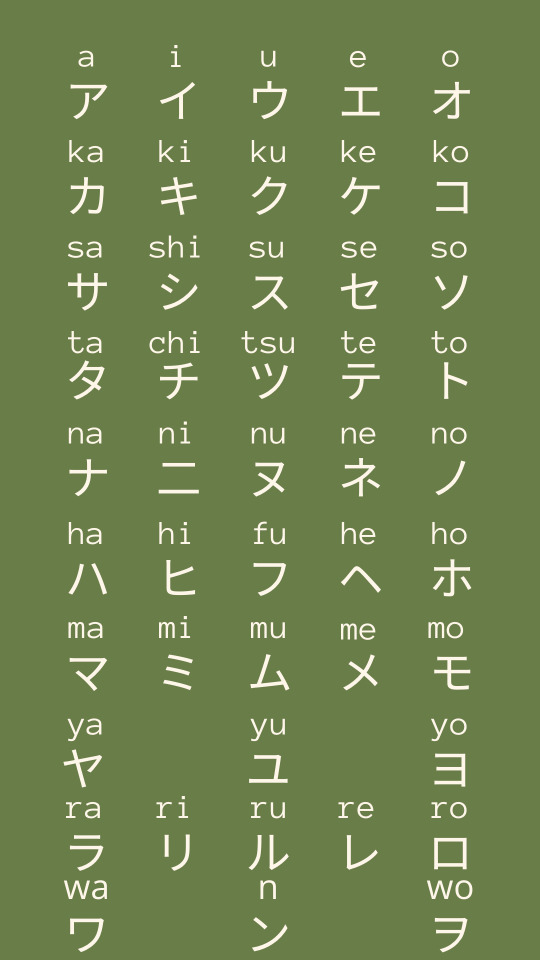
I know it’s nothing special, but I figured I’d share incase anyone wants it.
If you want to use this yourself but want a different color, literally just send me an ask with the color code and i’ll make it for you!
705 notes
·
View notes
Text
Planty Stuff Pt3.

Soil dojō 土壌
Lime tree raimu no ki ライムの木
Sunflower himawari ひまわり
Tree trunk ki no miki 木の幹
Garden hose niwa no hōsu 庭のホース
Worm wāmu ワーム
Orchard kajuen 果樹園
Vineyard budō hatake ぶどう畑
Leaves ha 葉
Flowers grow hana ga sodatsu 花が育つ
Gloves tebukuro 手袋
Green beans ryokushoku no mame 緑色の豆
Vegetables yasai 野菜
Lenses renzu レンズ
Weeds zassō 雑草
Garden tools engei kōgu 園芸工具
Peas endō mame エンドウ豆
Chickpeas hiyoko mame ヒヨコマメ
Garden shed niwa no koya 庭の小屋
Weed zassō 雑草
Water the flowers hana ni mizu o yaru 花に水をやる
Picking flowers hana tsumami 花摘み
Plant kōjō 工場
Push osu 押す
Mow the lawn shiba o karu 芝を刈る
Fertilize koyasu 肥やす
146 notes
·
View notes
Text
とんでもない
① that's okay, no problem, don't mention it
Aさん: この前はありがとうございました。
Thank you for the other day.
Bさん: いいえ、とんでもないです。
No, that was no problem.
Aさん: この前はすみませんでした。
I'm sorry about the other day.
Bさん: いえ、とんでもないです。
No, that's okay.
② unthinkable, unexpected, offensive, outrageous
Aさん: 日本語の勉強をやめましょう。
Let's stop studying Japanese.
Bさん: とんでもないことを言っていますね。
What you are saying is outrageous.
③ absolutely not, far from it, no way
彼が学者だなんてとんでもない。
He is anything but a scholar.

225 notes
·
View notes
Text
Let's Learn Natively (TL :Japanese) | Reading
Why it's important to read as much native materials as you possibly can in your target language and where/how to start.
※ When learners first embark on their journey of picking up a new language, the first thing we do is familiarize ourselves with the alphabet, pronunciation, and other important innerworkings on the language. With Japanese, the first step is to learn hiragana and katakana. A lot of people stop in the middle of that because they feel that it's not worth learning the language if they have to learn that many letters. But what if you've made it past that point? Where do you go from there? Of course, we move on to basic grammar and sentence structure so that you can begin to understand why sentences are formed the way that they are. (and, of course, vocab words).
※ However, while textbooks and workbooks do teach us the way that sentences are formed, it's stiff. Of course, the purpose behind that is to make sure that you understand the basics before you move on to more native/nuanced versions of the structures. But once you're ready to do that, where do you go? Click below to keep reading:
★If you're ready/interested in reading native material, and you don't know where to start, I highly recommend trying out Natively. Think of this as a goodreads for Japanese learners.
★If you're concerned about picking a book or series that's too difficult or too long for you, the website has already taken that into account. The website is structured so that all of the books and series that are on there are added, graded, and reviewed by fellow Japanese learners. The grading system that is utilized goes from Level 0 to Level 41; the grades roughly correspond with JLPT levels (if you're preparing for the JLPT and are trying to prepare for the reading comprehension section). You can learn more about the grading system by clicking here.
★The website includes all sorts of books: textbooks, graded readers, light novels, manga, novels, children's books, short stories, and other kinds of books. When you click on a title or see it in the search results, the color coded grade will pop up next to it. These grades are user-determined. When users finish reading a book, we're prompted to grade the difficulty level in comparison to other books that we may have already read. In doing so, the difficulty level of the book might change when calculated in with other reviews. The point of this is to help fellow learners gauge what types of reads you find find difficult and which ones you find to be easy. Here's an example photo:
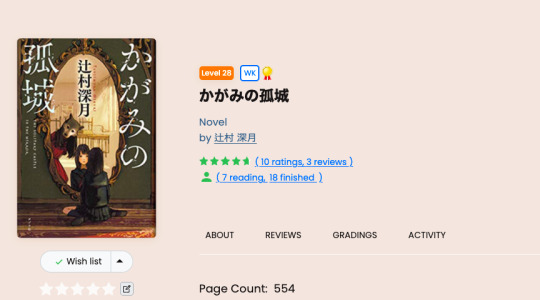
☞Caveat: don't feel discouraged if you found a book to be difficult even though it didn't seem like it would be. Everyone thrives in different areas and different subjects. Just because something was graded at N5 and you had difficulties with it at N3 doesn't mean anything--it might mean that it wasn't something to your liking. There are some series that I have difficulty with because of pacing or because I lacked interest in it.
❀ If you're worried about reading a book or series on your own and you're looking for friends to read and discuss about it with, come join us over on the discord and propose it as an option in the bookclub.
㉄ Can't find a particular book or series that you're looking for on the website? You can request for it to be added here.
★ The website is also equipped to let you "organize" your library into categories and track your reading progress. Additionally, you can make your library and reading progress private if you don't want anyone to see. As I'm currently using this blog to be as open as I can possibly be on my language learning journey, mine is made public. Feel free to check me out on the website.
★This is not sponsored, but if you receive a welcome message from Brandon, the owner and creator of the website, tell him that maobuchou sent you (that's me! ☺️). Brandon is really nice, so if there's anything that you're confused about or if you have suggestions for the website, he has an option for you to contact him.
★If you're interested in seeing what I'm currently reading, what I'm interested in reading next, and what I've graded thus far, click here to follow me (I'll follow back). Following other users allows you take a peek at what books they're reading. I also update my profile to say what book is also being read in the discord bookclub.
There will be more posts to come in the future about ways to become comfortable with reading in your target language.
460 notes
·
View notes
Text
肌「はだ」のケアの単語

I’ve been watching a lot of J-beauty YouTubers and getting into Japanese skincare. I might make another skincare vocabulary post just because I love talking about skincare lol
Routine/Product Vocabulary
クレンジング: oil cleansing, *can use する with this word
メイク落とし 「おとし」:makeup remover
メイク落としを使う 「つかう」:to use makeup remover
洗顔 「せんがん」: water based cleansing, *can use する with this word
化粧水 「けしょうすい」: it’s translated to lotion in English buts it’s more of a hydrating toner
美容液 「びようえき」:essence/serum/ampoule
乳液 「にゅうえき」: lotion/emulsion
化粧水 / 乳液を付く 「つく」:to put on toner/lotion
保湿「ほしつ」クリーム:moisturizing cream like the thicker stuff for dry skin
日焼け止め 「ひやけどめ」 クリーム:sunscreen
美容液 / 保湿「ほしつ」クリーム / 日焼け止めクリームを塗る 「ぬる」:to put on serum/moisturizing cream/sunscreen
Skin Types
乾燥肌 「かんそうはだ」:dry skin
脂性肌 「あぶらしょうはだ」:oily skin
混合肌 「こんごうはだ」:combination skin
敏感肌 「びんかんはだ」:sensitive skin
普通肌 「ふつうはだ」:normal skin
452 notes
·
View notes
Text
so much of learning japanese is looking at the grammar rules and going “what?? why?!?”
269 notes
·
View notes
Text
嵐 「あらし」 storm
淹れる 「いれる」 to make (tea, coffee)
歳下 「としした」 younger
歳上 「としうえ」 older
柊 「ひいらぎ」 holly
父親 「おやじ」 father
濡れる 「ぬれる」 to get wet
虹色 「にじいろ」 rainbow-colored
匂い 「におい」 odor
半端 「はんぱ」 remnant, half-hearted
見出す 「みいだす」 to find out, to select
綴る 「つづる」 to spell, to write, to sew together
射す 「さす」 shine
覆う 「おおう」 to cover, to hide
憂鬱 「ゆううつ」 depression, melancholy
居候 「いそうろう」 freeloader
椅子 「いす」 chair
亡くなる 「なくなる」 to die
嬉しい 「うれしい」 happy, joyful
黄昏 「たそがれ」 dusk, twilight
虹 「にじ」 rainbow
瞳 「ひとみ」 pupil
観る 「みる」 to see, to watch
同棲 「どうせい」 cohabitation, living together
哀しい 「かなしい」 sad, miserable, lamentable
夜更け 「よふけ」 late at night
愕然 「がくぜん」 astonished, shocked
昏睡 「こんすい」 coma, deep sleep
闇 「やみ」 darkness, the dark
滅入る 「めいる」 to feel depressed
淋しい 「さびしい」 lonely, lonesome
自虐 「じぎゃく」 self-torture, masochism
群青 「ぐんじょう」 ultramarine
薄闇 「うすやみ」 very dim light
悪寒 「おかん」 chill, shakes
翻弄 「はんろう」 having at one's mercy, toying with
351 notes
·
View notes
Text
cozy Japanese youtube channels~
here are some youtube channels I recommend if you want to enjoy some easy-going, chill content in Japanese ^-^
Haru ch. はる🌷 🌿 i recommend her animal crossing streams! her town is really pretty and the language she uses is quite easy to follow ^^
nao 🌿 she makes wonderfully calm and relaxing videos of her daily life. she doesn’t talk in her videos but she narrates what’s she’s doing via subtitles (if you prefer reading then you’ll enjoy this channel!)
Choki 🌿 similar to naoさん. lovely aesthetic/asmr videos following her daily life (and lots of delicious cooking!)
カフェとノート / Nakanote 🌿 stationary/study channel. i really like her narration style and note-taking tips!
in living. 🌿 one my fave youtube channels! she chats about recent purchases, moving house, morning/night routines etc. super chill and enjoyable to watch.
those are my recommendations! let me know if you end up watching any of these channels (and if you have similar recs please reply and i’ll check them out!)
805 notes
·
View notes
Text
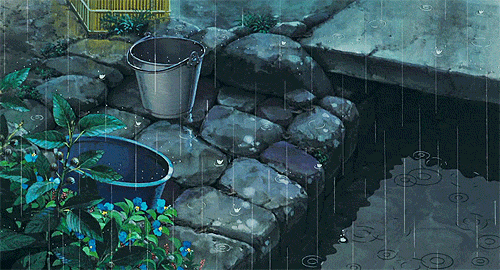
雨の音・The Sound of Rain
ぽつぽつ in drops, falling lightly
ぱらぱら falling in large drops (e.g. rain, hail), pattering, clattering
しとしと gently raining, drizzling
ざあざあ raining heavily
どしゃどしゃ downpour, pouring rain, heavy rain
838 notes
·
View notes